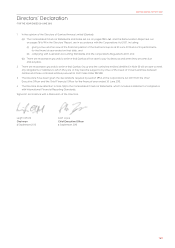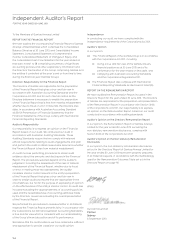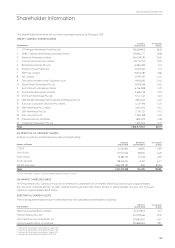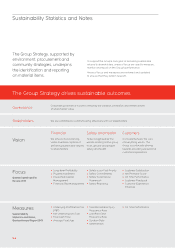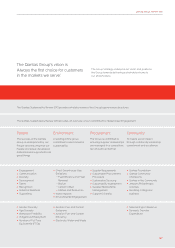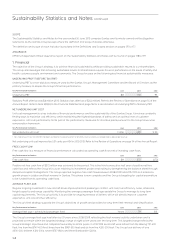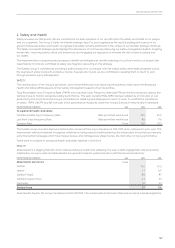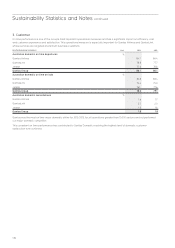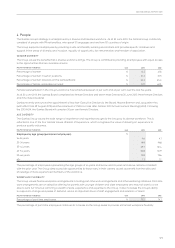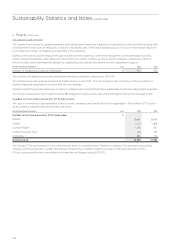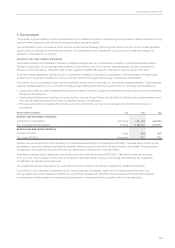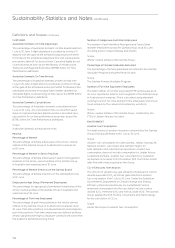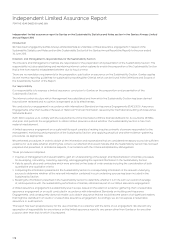Qantas 2013 Annual Report Download - page 175
Download and view the complete annual report
Please find page 175 of the 2013 Qantas annual report below. You can navigate through the pages in the report by either clicking on the pages listed below, or by using the keyword search tool below to find specific information within the annual report.
173
QANTAS ANNUAL REPORT 2013
5. Environment
The growth of global aviation and the present reliance on traditional aviation fuel means growing industry carbon emissions during
a period when emissions reductions are being mandated across the globe.
Fuel optimisation is the cornerstone of the Group’s environmental strategy. Improving fuel efciency is one of the Group’s greatest
opportunities to manage its environmental impact. Fuel optimisation also enables the Group to reduce costs and mitigate its
exposure to uctuations in oil prices.
AVIATION FUEL AND CARBON EMISSIONS
The Qantas Group has committed to achieving ambitious targets set out for international aviation, by the International Aviation
Transport Association, of an average improvement in fuel efciency of 1.5 per cent per year (measured as litres of fuel per 100
Revenue Tonne Kilometres – RTKs) through to 2020, against a 2008/2009 baseline, and carbon neutral growth from 2020.
To achieve these targets the Qantas Group is committed to emissions reductions, pursuing the commercialisation of sustainable
aviation fuel in Australia, investing in more fuel efcient aircraft and engine technology, and process optimisation.
The Qantas Group is investing in newer, more fuel efcient aircraft which, in the long run, will offer the greatest benets. This investment
is being complemented by a focus on technical and process initiatives that improve fuel performance, including, but not limited to:
»Collaboration with air trafc management providers to improve airspace usage and implement new procedures, such as Required
Navigation Performance
»Engineering initiatives that optimise fuel consumption, such as Ground Power Unit and Pre-Conditioned Air implementation, and
new aircraft wash techniques that reduce drag and improve fuel efciency
»Process optimisation procedures that improve aircraft performance, such as load management and rened scheduling
procedures
Key Performance Indicators Unit 2013 2012
Aviation fuel and carbon emissions
Aviation fuel consumption ’000 Litres 4,834,093 4,876,999
CO2 -e emissions from aviation Tonnes 12,383,245 12,493,157
Aviation fuel and carbon efciency
Fuel per 100 RTKs Litres 38.8 38.8
CO2 -e per 100 RTKs Kilograms 99.5 99.3
Aviation fuel consumption and the resulting CO2-e emissions were 0.9 per cent lower than 2011/2012. This was driven mainly by the
decrease in capacity in Qantas International, partially offset by capacity growth in Qantas Domestic and Jetstar. The acquisition
of Australian air Express during 2012/2013 also increased total consumption in Qantas Freight.
Australian domestic carbon emissions from aviation fuel were 4.63 million tonnes (2011/2012: 4.38 million tonnes) an increase
of 5.7percent. This increase is in line with an increase in domestic ASKs of 5.6 per cent during 2012/2013 and the acquisition
of Australian air Express during the year.
The Qantas Group has achieved 3.2 per cent improvement in aviation fuel efciency against the 2008/2009 baseline.
Fuel efciency is a long-term commitment as the Group executes its strategic objectives and transforms its network. Fuel
saving targets have been agreed across the Group’s ying businesses for 2013/2014 and activities such as international eet
re-conguration, eet renewal and ongoing fuel optimisation activities will have a positive effect on fuel efciency.


